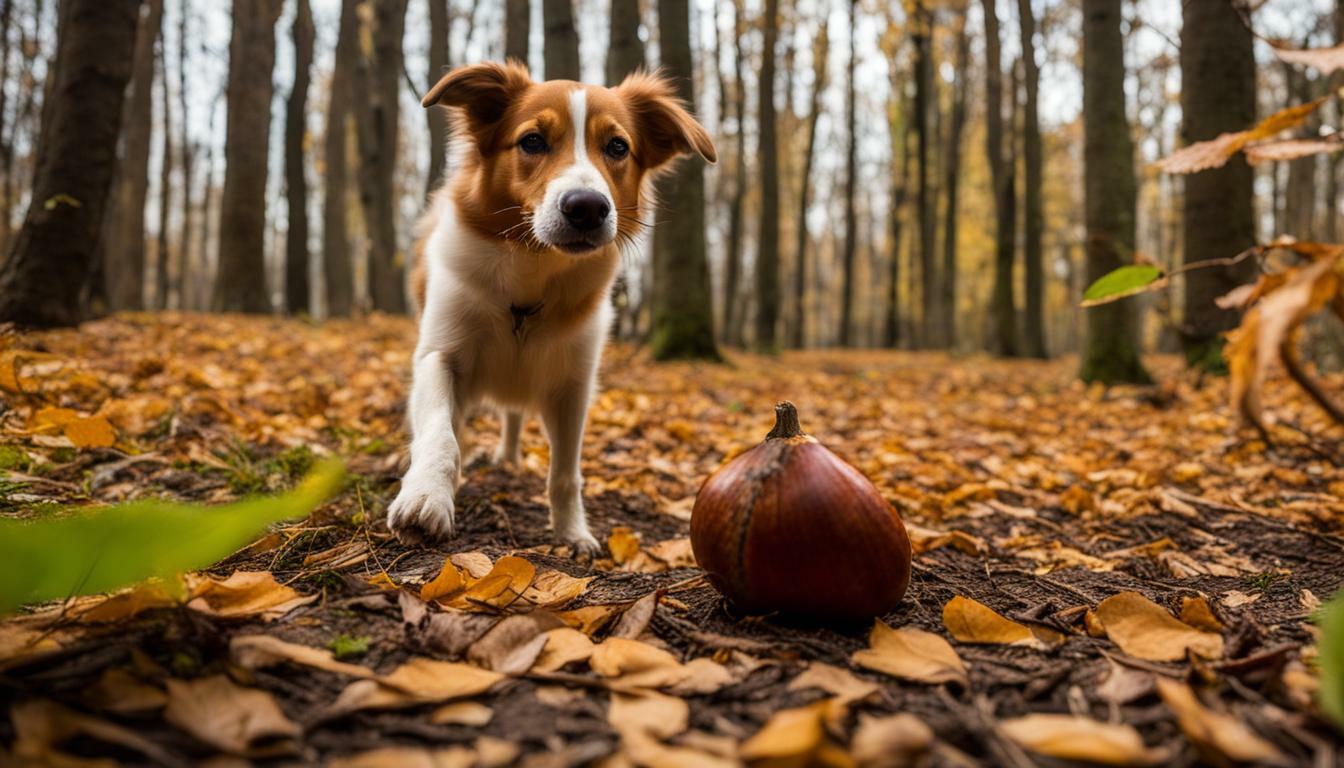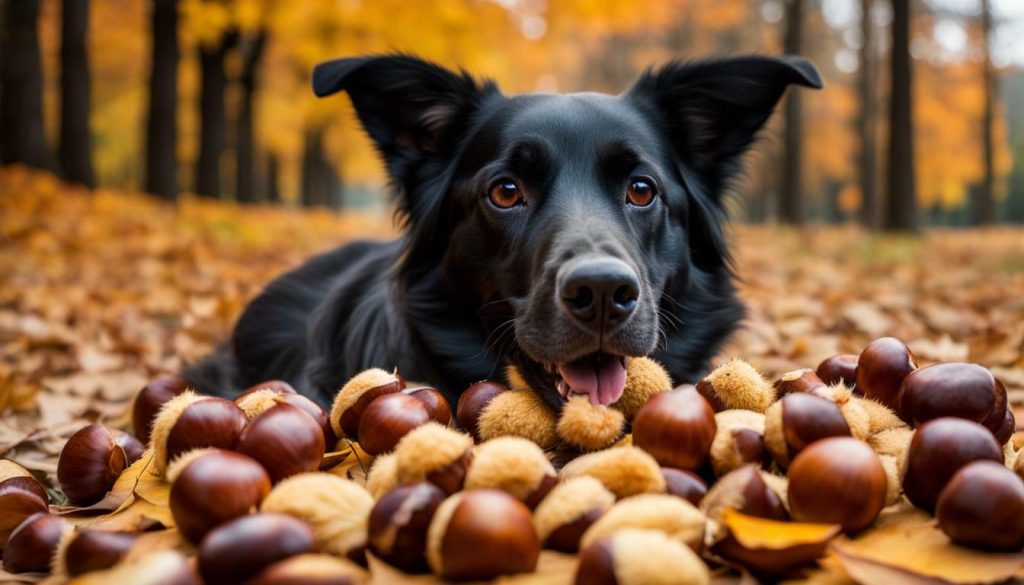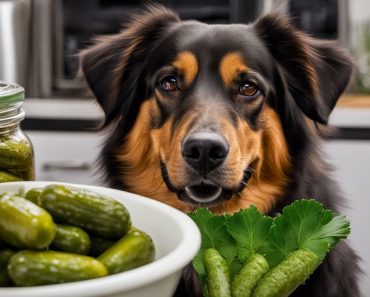
If you’ve ever wondered whether dogs can eat chestnuts, you’ve come to the right place. In this guide, I will provide you with all the information you need to know about feeding chestnuts to your furry friend. We will explore their safety, nutritional value, and guidelines for incorporating them into your dog’s diet. Let’s dive in!
Key Takeaways:
- Chestnuts can be safe for dogs to eat in small quantities.
- Avoid feeding horse chestnuts to dogs as they can be toxic.
- Chestnuts provide nutritional benefits, including fiber, omega fatty acids, and potassium.
- Feed chestnuts as an occasional treat and avoid giving raw or seasoned chestnuts to dogs.
- Canned water chestnuts should be avoided due to their high sodium content.
Are Chestnuts Safe for Dogs?
When it comes to feeding your dog chestnuts, it’s important to know which types are safe for them to consume. Dogs can eat chestnuts in small quantities, as most varieties are non-toxic to them. However, it is crucial to avoid horse chestnuts, as they contain substances that can be risky for dogs.
Chestnuts provide nutritional value for dogs and can be a healthy addition to their diet when fed in moderation. They are a good source of fiber, which can aid in digestive health, and omega fatty acids, which contribute to a shiny coat and overall skin health. Additionally, chestnuts are rich in potassium, an essential mineral that supports proper muscle function.
While chestnuts can be a nutritious treat for dogs, it’s important to take some precautions. Raw or seasoned chestnuts should be avoided, as they might contain ingredients that could be harmful to your pet. Canned water chestnuts, although safe for human consumption, should also be avoided due to their high sodium content, which can be detrimental to a dog’s health.
| Type of Chestnut | Safety for Dogs |
|---|---|
| Edible Chestnuts | Safe for dogs in small quantities |
| Horse Chestnuts | Avoid, as they are toxic to dogs |
| Raw or Seasoned Chestnuts | Avoid, as they may contain harmful ingredients |
| Canned Water Chestnuts | Avoid, due to high sodium content |
Before introducing chestnuts or any new foods to your dog’s diet, it’s always a good idea to consult with your veterinarian. They can provide personalized advice based on your dog’s specific needs and health conditions, ensuring their well-being and helping you make informed decisions about their nutrition.

Nutritional Value of Chestnuts for Dogs
Adding chestnuts to your dog’s diet can provide them with several important nutritional benefits. Chestnuts are a good source of fiber, which aids in digestion and helps maintain a healthy gastrointestinal tract for your furry friend. They also contain omega fatty acids that support a shiny coat and healthy skin.
Potassium is another essential nutrient found in chestnuts, which plays a crucial role in maintaining proper muscle function and heart health for dogs. These nutrients make chestnuts a valuable addition to a balanced and nutritious canine diet.
It is important to note that while chestnuts offer nutritional benefits, they should be fed to dogs in moderation. Too many chestnuts can lead to digestive upset or weight gain. Always consult with your veterinarian to determine the appropriate portion sizes for your dog based on their size, age, and overall health.

Guidelines for Feeding Chestnuts to Dogs
While chestnuts can be a healthy addition to your dog’s diet, it’s important to follow some guidelines to ensure their safety.
1. Choose the right chestnuts: Opt for non-toxic chestnut varieties that are safe for dogs. Avoid horse chestnuts, as they contain substances that can be risky for your furry friend.
2. Cook the chestnuts: Raw chestnuts can be difficult for dogs to digest. Therefore, it is recommended to cook them before feeding them to your dog. Boiling or roasting the chestnuts is a great way to make them more palatable and easier for your pup to eat.
3. Remove the shell and skin: Before offering chestnuts to your dog, be sure to remove the outer shell and skin. These parts can be tough and can pose a choking hazard to your dog. Serve the chestnuts in small, bite-sized pieces to make them easier to chew and digest.
4. Feed in moderation: While chestnuts offer nutritional benefits, it’s important to remember that they should be given to your dog as an occasional treat. Too many chestnuts can be high in calories and may lead to weight gain or digestive issues. As with any new food, introduce chestnuts gradually and monitor your dog’s reaction.
Table: Safe and Unsafe Chestnuts for Dogs
| Safe Chestnuts | Unsafe Chestnuts |
|---|---|
| European Chestnuts | Horse Chestnuts |
| American Chestnuts | – |
| Chinese Chestnuts | – |
Remember, it’s always best to consult with your veterinarian before introducing new foods to your dog’s diet. They can provide specific advice based on your dog’s individual needs. By following these guidelines, you can safely incorporate chestnuts into your dog’s diet and treat them to a delicious and nutritious snack!

Conclusion
In conclusion, the answer to “Can dogs eat chestnuts?” is yes, but with some important considerations and guidelines in mind. Dogs can safely consume most varieties of chestnuts, as they are non-toxic and offer nutritional value. However, it is crucial to avoid feeding them horse chestnuts, as these contain substances that can be risky for dogs.
Chestnuts provide essential nutrients for dogs, including fiber, omega fatty acids, and potassium. These nutrients contribute to a balanced and healthy diet for our furry friends. It is important to feed chestnuts to dogs in moderation, as an occasional treat rather than a staple food.
When feeding chestnuts to dogs, it is crucial to avoid giving them raw or seasoned chestnuts, as these may contain ingredients that could be harmful to their digestion or overall health. Additionally, canned water chestnuts should be avoided due to their high sodium content, which may not be suitable for dogs.
As with any new food, it is always recommended to consult with a veterinarian before introducing chestnuts or any other unfamiliar food into your dog’s diet. They can provide personalized guidance and advice based on your dog’s specific needs and dietary requirements.
FAQ
Can dogs safely eat chestnuts?
Yes, most chestnuts are non-toxic to dogs and can be consumed safely in small quantities.
Are all types of chestnuts safe for dogs?
No, horse chestnuts should be avoided as they contain substances that are risky for dogs.
What nutritional value do chestnuts provide for dogs?
Chestnuts are a good source of fiber, omega fatty acids, and potassium, providing nutritional value for dogs.
How should I feed chestnuts to my dog?
Chestnuts should be fed as an occasional treat, avoiding raw or seasoned chestnuts. It is important to consult with your veterinarian for specific guidelines.
Can dogs eat canned water chestnuts?
It is best to avoid canned water chestnuts due to their high sodium content, which may not be suitable for dogs.






